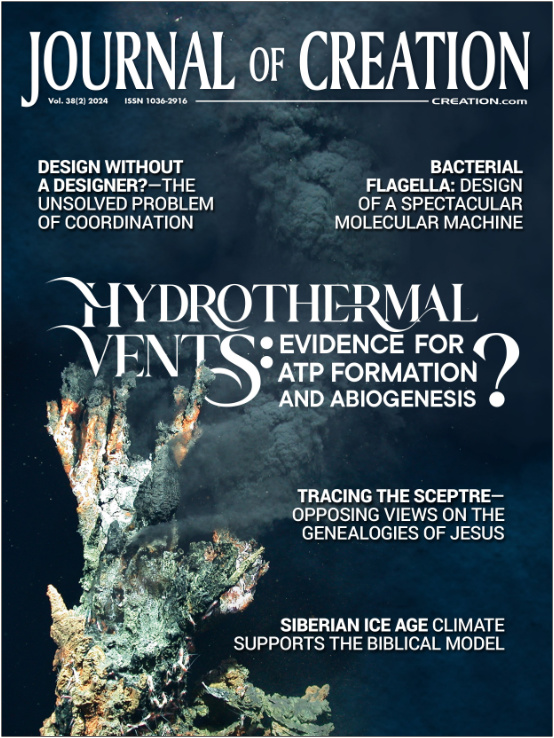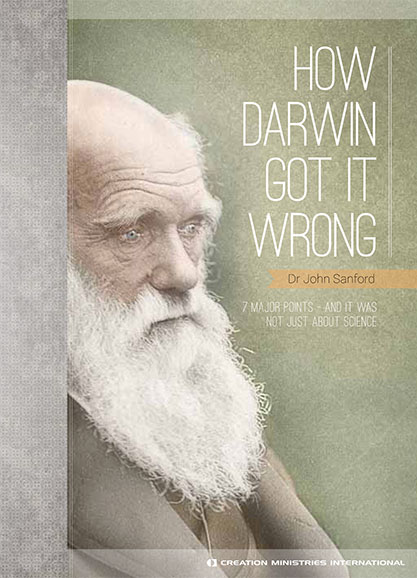Journal of Creation 38(2):25–27, August 2024
Browse our latest digital issue Subscribe
How Darwin evaded the lack of evidence for his theory
A review of: Darwin’s Bluff: The mystery of the book Darwin never finished by Robert F. Shedinger
Discovery Institute Press, Seattle, WA, 2022
Author Robert F. Shedinger is a professor of religion at Luther College in Decorah, Iowa. He specializes in the religion/science relationship.
This book is about Darwin’s promised sequel to The Origin of Species (figure 1), in which Darwin promised to supply the proofs that were lacking in his ‘outline’ Origin of Species, but which was never published. No-one called Darwin out on his broken promise, much less questioned any aspect of evolution. Instead, Darwin got much ‘hero worship’, much like the fabled emperor that has no clothes, yet everyone affirms and blindly cheers his clothes.
This book also discusses recent members of the Intelligent Design (ID) movement, and the discrimination that they face because of their views. It makes for chilling reading.
Author Shedinger does some discerning. He asks why textbooks continue to use Ernst Haeckel’s doctored drawings of embryos, when modern technology allows for digital photographs. He discerns that the latter would not be as convincing of evolution (p. 227).
Did uniformitarian geology inspire Darwin’s organic evolution?
In the past, creationists have pointed to a connection between uniformitarianism and evolution. Both attacked biblical orthodoxy: the former disavowed the Flood and the young earth, while the latter disavowed the special creation of living things. Both advocated that changes on Earth and to its living things happen naturalistically and slowly (on average) and over long periods of time. So-called old-earth creationists, on the other hand, wanting to have a foot in both camps, have tended to view the two as completely separate developments.
Shedinger sheds some light on this question. He elaborates on Darwin’s early geologic field work and his fascination with Lyellian uniformitarianism. While not going into detail, he affirms a connection between geologic uniformitarianism and organic evolution, at least in Darwin’s thinking.
Thus, Shedinger writes:
“Even before returning to England, Darwin was laying plans to make his mark in geology despite his lack of professional training in the discipline. Lyellian uniformitarianism was becoming his new religion, a religion that would form the foundation of his species work [emphasis added]” (p. 53).
Uniformitarianism a religion—good choice of words.
Darwin’s disingenuous advocacy of evolution
The author does a thorough analysis of Darwin’s thinking. He finds some frankly deceptive argumentation on the part of Darwin. He comments:
“He (Darwin) admits that the issue is indeed perplexing, but then passes off valid and substantive criticism as just ‘two or three puzzles’. But most importantly, he bases his continued confidence in his theory on the grounds that it ‘explains so well many facts’. Philosophers of science have long recognized that the same set of facts can be explained by more than one theory; this is the problem of underdetermination. If one starts with a theory; then interprets the facts through the lens of that theory, then of course it may look like the facts prove the theory” (p. 57).
Elsewhere, Shedinger points out Darwin’s shoddy scientific reasoning. He writes:
“Darwin’s instincts, alas, often proved unreliable. Following the publication of the Origin, he was particularly stung by criticisms that he had not followed the inductive method. But such criticisms should not have come as a surprise for someone so guided by instinct. Darwin did not accumulate data and then reason from the data to general principles. He rather developed general principles by instinct and then tried to find data to support them, frequently becoming frustrated when perverse nature defied his will [emphasis added]” (p. 90).
Darwin also deflected legitimate questions about his theory by engaging in what today is called gaslighting. The author writes, “As we saw earlier, Darwin’s favorite line of response to his critics was to accuse them of not understanding his theory” (p. 155). How convenient!
Darwin performed a bait and switch
Shedinger writes:
“Darwin downplayed expectations by informing his readers that the Origin was a mere abstract of a larger work on species that he hoped to publish shortly after the Origin. But when criticisms of the abstract came in and Darwin realized his big book would not effectively address these criticisms, he abandoned the idea of publishing the big book and turned instead to orchids” (p. 199).
How could this happen? Darwin could get away with never publishing his promised second book, because most people just came to accept Darwin’s ideas and never held Darwin’s broken promise against him.
The author suggests that the evolutionary establishment did a bit of a cover up about Darwin’s promised second book, and that is why so few people ever heard of it. I agree. I have been studying evolution for some decades, and had never before heard of this second book.
Adaptationist just-so stories are not evidence
Storytelling about how a feature in an organism may have evolved is a characteristic of both Darwin and of modern evolutionary theory. Shedinger comments:
“In any case, Darwin was never going to be able to satisfy his readers with mere imaginary scenarios about how natural selection might work in hypothetical situations. His readers were expecting hard evidence. But despite his many earlier comments building up expectations, the big book was sorely lacking in this regard” (p. 182).
Note that this consideration parallels that used against creationism: an organism has a particular feature because God made it that way. Only now the organism has a particular feature because natural selection made it that way.
In the end, Darwin never proved his case
The problem with Darwinism went beyond just-so stories. The author is rather harsh on Darwin as he concludes:
“Where cogent confirming evidence for the creative powers of natural selection were called for, there was instead only talk of geographic distribution, microevolution of domesticated breeds via artificial selection, and imaginative just-so stories about bears evolving into whales and such” (pp. 199–200).
Darwin a racist? Darwin a sexist? Leftist hypocrisy
The author brings up the question of Darwin’s attitudes regarding slavery, racism, and gender issues. Rather than wading through these questions yet again, as has been done by creationists in the past, I look at deeper and more contemporary matters that Shedinger does not discuss.
Nowadays, so-called ‘progressive’ pseudo-intellectuals are prone to pontificate and do virtue signalling about the racism and sexism of ‘dead white males’. In the United States, for example, this has policy issues. Statues to Columbus have been torn down via mob action, and there have been serious calls to take down the statues of American historical figures such as George Washington and Thomas Jefferson—all because of their alleged ‘racism’. I know, from personal experience, that bird-watching organizations such as local chapters of the Audubon Society have been renamed because of Audubon’s alleged racist leanings. As an educator, I know a school district where schools long named after the explorer Boone and after the biologist Agassiz have been renamed for the same reason.
The foregoing also happens in other western nations.
Enter Darwin. I have yet to hear of a single instance of an institution bearing the name of Darwin getting renamed because of any racism or colonialism that Darwin may once have held! Instead, we usually hear the exculpatory line, ‘Darwin was a product of his time’. Exactly right. Yet this common-sense consideration is applied selectively, and Darwin gets excused, while various other “dead white males” do not.
This also touches on the matter of unequal rights. Evidently, ‘progressives’ have discovered some sort of right to cancel historical figures not to their liking, in public policy matters, while Christians never have a right to cancel Darwin should they be so inclined.
Why the hypocrisy and double standards? Could it be that Darwin is exempt from cancel culture’s wrath because of his iconic status as the one that has ‘discredited’ Christian orthodoxy and as the one who has fostered evolutionistic thinking in our collective minds?
Ongoing discrimination against creationists and proponents of ID
Shedinger discusses the blatant flouting of the critical inquiry that is supposed to characterize science. Consider these incidents:
Eric Hedin, a onetime physics professor at Ball State University, taught a popular course that introduced students to the evidence of design in biochemistry and cosmology. Pressure from America’s atheistic Freedom from Religion Foundation pressured the university to cancel the course.
Gunter Bechly is a paleontologist and internationally recognized expert on fossil insects. He long accepted evolution, but began to question it and to entertain the possibility of Intelligent Design. He was fired as the curator at the State Museum of Natural History in Stuttgart, Germany.
Cuban-American Guillermo Gonzales was an astronomer with an extensive publication record. He was forced out of the astronomy department of Iowa State University because he coauthored a book, The Privileged Planet, which pointed to evidence of intelligent design.
Let us keep these odious events in perspective. Imagine any professor subject to such treatment for attacking God or Christianity. It would make front page headlines, and we would not hear the end of it.
‘Creationists do not publish’—the exception that proves the rule
Two Scandinavian scientists, Steinar Thorvaldsen and Ola Hossjer, got a mathematically based study of intelligent design approved by the referees, and published in the prestigious Journal of Theoretical Biology. It explicitly endorsed the works of ID scientists such as Michael Behe, William Dembski, and Douglas Axe.
The reaction of evolutionists was beyond hysterical! As Shedinger comments:
“The editors clearly thought the paper made a significant contribution to biology and sent it out for peer review. The peer reviewers must have agreed, and so the paper was published. This touched off a firestorm of criticism toward the journal for publishing a paper so favorable to intelligent design, an idea derided as religiously motivated pseudo-science by establishment biologists. How, critics wanted to know, could the editors and peer reviewers have possibly let such a worthless piece of research into the journal, a move that would only serve to embolden these pseudoscientific quacks? The backlash was so severe that the editors published a disclaimer several months later … . This disclaimer, of course, does not pass the smell test. First, the professors listed their university affiliations because they were in fact professors at those universities. Also, as noted, the paper is so shot through with intelligent design thinking and references to leading intelligent design thinkers that no one reading the paper could miss it. Clearly, the editors and peer reviewers thought that scientific evidence for intelligence [sic] design in biology was an appropriate topic for the journal, the editors making an about-face only after the angry backlash [emphasis in original]” (p. 230).
Let us analyze this ‘shocking’ development. For the longest time, evolutionists have asserted that creationists do no science, as demonstrated by the fact that scientific journals do not contain any creationist studies. Then, when faced with the fact that scientific journals will not publish creationist studies, they change their argument. They say that creationists do not do any research that would merit publication in a scientific journal. The experience of Thorvaldsen and Hossjer graphically exposes the complete dishonesty of this long-repeated evolutionistic argument.
We clearly see that the evolutionary establishment is not merely prejudiced against creationists. Their comically hysterical reaction to this ID paper, published in a top journal, speaks volumes about the vehemence of their antipathy to anything that challenges evolutionary orthodoxy. So much for objective science!
Conclusions
Darwinism was mostly speculation from the beginning, and thus it continues today. Darwin was never held accountable for not producing his second book because most people let it slide, accepting Darwin without the hard evidence that his theory required. And so it continues today.
The absolute fury with which the evolutionary establishment deals with any creationist and Intelligent Design challenges to their theory itself is telling about their insecurity and their deep realization that their evolutionary theory, far from proven fact, is inadequate.






Readers’ comments
Comments are automatically closed 14 days after publication.